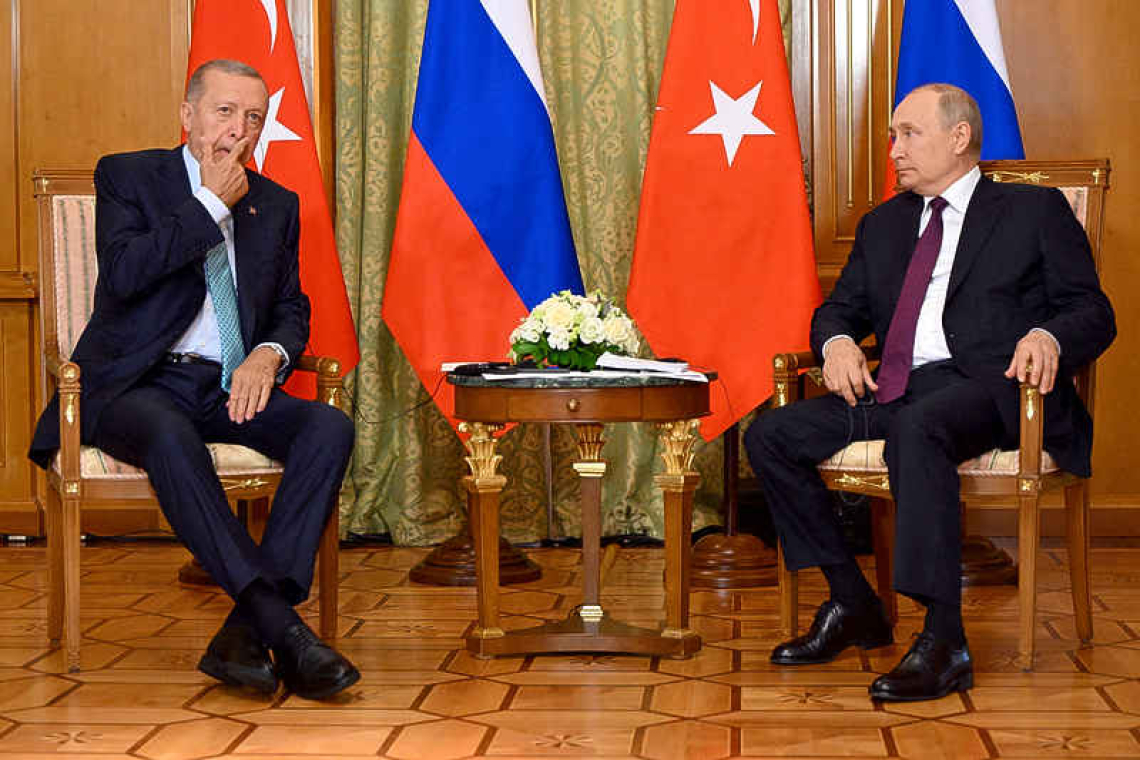ISTANBUL--A U.S. threat to hit financial firms doing business with Russia with sanctions has chilled Turkish-Russian trade, disrupting or slowing some payments for both imported oil and Turkish exports, according to seven sources familiar with the matter.
The U.S. executive order in December did not explicitly target energy but it has complicated some Turkish payments for Russian crude as well as Russian payments for a broader range of Turkish exports, the sources said. U.S. sanctions aim to reduce the Kremlin's revenue and disrupt its war in Ukraine without choking Russian oil flows to global markets, to avoid a politically sensitive jump in U.S. gasoline prices with President Joe Biden seeking re-election in November. However, similar payment problems to those now faced by Turkey have already disrupted Russian oil supplies to India and complicated those to the United Arab Emirates and China, according to oil traders. Russia is the top crude and diesel exporter to energy-poor NATO member Turkey, supplying 8.9 million metric tons of crude and 9.4 million tons of diesel to its Black Sea neighbour in the 11 months to November. The emerging payment issues are due to Turkish banks reviewing business and tightening compliance with Russian clients, four of the sources said. They have not disrupted Turkey's crude supplies, delaying only a small number of cargoes, two oil industry sources said. A source with a Russian oil major said Russian oil exporters have not received payments from Turkey for two to three weeks. "It has become difficult to make some energy payments to Russia, especially after the new sanctions (threat) at the end of December. Some payments were disrupted," a Turkish source familiar with the payments issue said. "The originally agreed upon method had to be changed or the payment had to be postponed, but the shipment continued. There may be problems on a cargo-by-cargo basis," the source said. The industrial and financial sector sources discussed the payment and trade disruption under condition of anonymity given they are not authorised to speak about the sensitive matter. "Payment issues began after December. The focus is not on oil imports, but it is unsettling. It has not impacted day-to-day functioning but reminds us that a problem could arise any time," a Turkish oil industry source said. The Turkish Treasury declined to comment when asked about the issue. Turkey's banking watchdog BDDK did not immediately respond to a request for comment. Ankara opposes Western sanctions on Moscow even as it has criticised Russia's invasion of Ukraine two years ago. It has managed to maintain close ties with both Moscow and Kyiv throughout the conflict. Though Ankara has said the sanctions will not be circumvented on Turkish soil, Washington ramped up pressure last year to halt the transit of dual-use goods that Russia could use on the battlefield, and has warned that Turkish banks and companies could be hit by secondary U.S. sanctions. The disruption to Russian-Turkish payments began when Biden signed the executive order on Dec. 22 threatening firms helping Russia circumvent sanctions with the risk of losing assess to the U.S. financial system. Financial institutions doing business on behalf of those targeted by U.S. sanctions are at risk, the order said. On Feb. 1, the Kremlin said it was aware of Turkish banks tightening rules on Russian clients due to "aggressive" U.S. pressure, and that it was working with Turkey to find solutions. Russian Central Bank Governor Elvira Nabiullina said on Friday that there were additional difficulties in foreign trade transactions related to settlements and logistics. One Turkish banker said banks carry out "extremely meticulous" procedures regarding sanctions, with compliance departments closely examining all transactions. "This issue is very sensitive and banks' compliance departments are on top of it," another banker said. A senior U.S. State Department official told Reuters it was encouraged by reports that Turkish banks are reviewing existing business and tightening their compliance programmes for Russian clients. "The President's Dec. 22 amendment to our Russia sanctions authority re-affirmed what we've said previously: that foreign financial institutions are responsible for ensuring they do not process transactions that benefit Russia's military or otherwise enable circumvention of our measures." "We have had extensive discussions with our Turkish partners over the last year. We will analyse January trade data once available and look forward to continuing those conversations," the official said. Initial data showed Turkish exports to Russia fell 39% year-on-year to $631 million in January, having increased 16.9% last year to $10.9 billion. Imports from Russia fell 20.2% in January to $4 billion, having dropped 22.5% in 2023 to $45.6 billion. Crude imports from Russia jumped more than two fold to 12 million tons in 2022. It supplied 8.9 million tons of oil to Turkey in Jan-Nov 2023, down 20% from the year before but still above the pre-war average. But much of the impact was on non-oil trade, sources said. "Exports of machinery, in particular, stopped simply because of the similarity with military equipment," the first source familiar with the issue said. "The real problem arises not with the payment that Turkey should make, but with the payment that Turkey will receive. This shows the high level of hesitation Turkish banks have towards sanctions," the source said.







